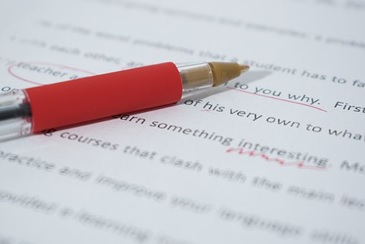 Not everyone is a natural writer. For many people, translating and wrangling English grammar lessons into thoughts that make sense on paper is a task that takes a lot of hard work and constant practice. However, whether one was born to be an author or barely able to string together a sentence, the advice is the same: keep writing!
Not everyone is a natural writer. For many people, translating and wrangling English grammar lessons into thoughts that make sense on paper is a task that takes a lot of hard work and constant practice. However, whether one was born to be an author or barely able to string together a sentence, the advice is the same: keep writing!
That’s right – if you have difficulty writing, daily practice will only help you improve; on the other hand, if you are already fairly comfortable with it, then it will only serve to make you better! It’s a win-win. That being said, whichever writing camp you find yourself in, there are a few grammar tips that you should try your hardest not to forget, no matter what.
Grammar Tips: Don’t Forget My Top 5!
The Pesky Apostrophe: Contractions, Plurals, and Possessives
Although it can be tempting, we don’t always need an apostrophe! Only use an apostrophe to show possession (I have the girl’s book.) or when making contractions (Please don’t yell!). You do not need to use an apostrophe when making a word plural (I have two cats at home.)
Haunting Homophones: Which “Witch” is Which?
Homophones are the cause of most of the typos I see on an everyday basis. For some people, they may have never mastered the difference between homophones; however, mistakes in this area can strike even the most seasoned writer who may be too distracted or working too quickly. If you haven’t already, devote some time to learning about the different common homophones, and if you already have, always be sure to take time to read over your work (or better yet – have someone else look over it!) to make sure you haven’t made a mistake – it is incredibly easy to do. Remember…
- To expresses location or is part of a verb: I want to go to the store.
- Too means “very” or “also”: I am too hot, too.
- Two expresses a number: My little sister turned two
- Their shows possession: That is their
- There expresses location: Please set the bag over there.
- They’re is a contraction for “they are”: They’re coming over tonight for dinner.
- Your shows possession: Do you like your new teacher?
- You’re is a contraction for “you are”: You’re going to be late if you don’t hurry up!
Of course, there are many other homophones, but these are some common mistakes to get you started.
The Crazy Comma: To Use or not to Use: That is the Question
It is no wonder commas give people so much trouble. While there are certain times commas are absolutely necessary (and other times when they should not be use at all), there are still other times when they can be used stylistically at the discretion of the author! If you are feeling uncomfortable with commas, start off by just focusing on when you definitely should use them.
- Commas in a list: I saw Mike, Tina, and Sharon at the farmer’s market.
- Commas in compound sentences: It was a very hot day, so I went to the pool.
- Commas with appositives: My grandma, a great baker, always makes my birthday cake.
- Commas after Introductory words: Last year, I went to Hawaii for vacation.
- Commas with dates, cities, and states: I was born on July 14, 1989, in Chicago, Illinois.
Taxing Tenses: Using Verbs Successfully
Verb tenses cause trouble for many writers, and it’s easy to see why: there are lots of them! However, for the most part, writers can safely get away with keeping them the same. For more advanced writing, there may be times and scenarios in which the tense will need to change, but for those who are just starting out, focus on maintaining the same tense throughout a piece.
This means if a story you are writing took place in the past, make sure your use past tense (Sally walked slowly towards the looming mansion and knocked on the large door.). If you are writing an essay about research happening in science right now? Use present tense (Research currently shows that students who study more get better grades on tests.)!
Don’t Know it? Don’t Sweat it!
One of my top tips I have said before and I’ll say again is this: “Don’t write yourself into a corner!” If you are not sure how to use something, look it up. If you don’t have time, don’t do it. If you aren’t sure if something is correct or not, and you don’t have an opportunity to check, don’t use it. Don’t spend all of your time stressing and worrying about writing.
As much as people don’t enjoy it sometimes, writing should be as fun as possible. At times, this means abandoning a complex idea that might come out incorrectly for a simple idea that will be correct and really pack a punch. If you write every day, you will eventually learn even the most complex rules, so don’t worry if you don’t know them all right now. They will come! Have fun, and always write what you know.
What do you think? What is the most common grammar error you see? What do you think is the number one grammar lesson students shouldn’t forget? We would love to hear from you in the comments!
Author: Emily Karth, Writer and Teacher at A Grade Ahead
